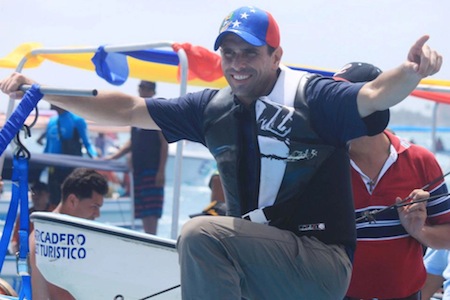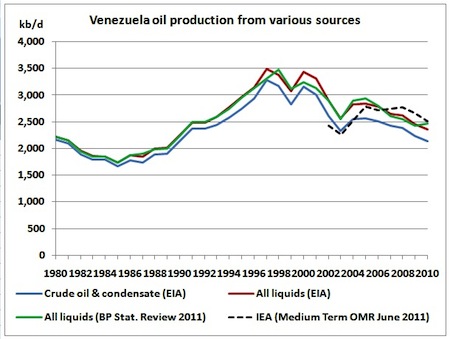Tuesday kicks off the official start of the campaign in Venezuela for the presidential election on April 14.![]()
It’s a little artificial, given that the campaign really began unofficially the day that Hugo Chávez died and certainly both the pro-chavismo and opposition forces have been preparing for such a campaign since Chávez left for his final, unsuccessful round of treatment in Cuba.
Not surprisingly, much of the pre-campaign has been waged on visceral and emotional lines — the pro-/anti- chavismo debate in Venezuela has become inextricably so linked to personalities and identity politics that it’s often hard to step back and articulate the policy rationale for each candidate. Henrique Capriles, the opposition candidate, has even stepped up his attacks against acting president Nicolás Maduro, in a much more insistent (even populist) tone than he ever took in his 2012 presidential campaign against Chávez.
That seems likely to intensify over the next 13 days.
But to the extent it’s possible to put aside the emotional in favor of policy, what policy arguments should sway, say, the moderate voter who enthusiastically supported Chávez in 1998 and well into the last decade but who has doubts about the performance of the government in recent years to make the jump to support Capriles (pictured above) and the broad Mesa de la Unidad Democrática (MUD)?
Perhaps the most overweening rationale is the old chestnut ‘power corrupts, and absolute power corrupts absolutely.’ After 14 years in power, with increasing access to and control over the levers of not just the Venezuelan government, but the Venezuelan economy and the Venezuelan military, chavismo, no matter its accomplishments, is rife with corruption. The sleaze that accumulates as the years of incumbency swell are hardly unique to Venezuela, where Chávez has often come close to, or even surpassed, the line from democrat to autocrat — just recall the wide disgust with the Tory government in the late 1990s.
So there’s some truth to the idea that ‘throwing the bums out’ from time to time is a relatively effective way to stem that kind of accumulated corruption, though there’s no guarantee — the former party duopoly of Acción Democrática (AD, Democratic Action) and COPEI (Comité de Organización Política Electoral Independiente) from 1958 to 1998 in Venezuela featured, especially by the 1970s, a revolving door of dueling, often corrupt, patronage machines. Though many of the non-chavista governors throughout the past decade have controlled local machines that are just as corrupt as Chávez, Capriles hasn’t himself been a dishonest governor of Miranda state, and so there’s hope he would usher in a cleaner, more transparent Venezuelan government.
But there’s no denying that the current problems in Venezuelan policy go well beyond corruption — ballooning budget deficits, unsustainable subsidies that essentially make gasoline free of cost to most Venezuelans (including a fair share of middle class and wealthy citizens), a crumbling oil infrastructure, a bloated public sector after 14 years of ever-expanding expropriation and bureaucracy, an underdeveloped non-oil economy, electricity shortages, and spiraling crime rates that have made Caracas one of the most dangerous states in the world.
Given those problems, it’s a wonder that anyone would want to become the next president.
Capriles is on record as saying that he would retain the popular misiones that have provided health care and educational funds to Venezuela’s poorest. But he would also undeniably take steps to move Venezuela toward more market-oriented policies.
While he may not have the political capital to eliminate the most popular subsidies, he would certainly move swiftly to reduce the handouts to Cuba and other leftist regimes.
Although Capriles also certainly would not privatize the state oil company, Petróleos de Venezuela, S.A., and he may not even significantly reduce the amount that the company contributes to Venezuelan social programs, he would likely try to rejuvenate an industry that’s seen peak output fall by a third since the beginning of the Chávez era:
One way for Capriles to do that, without necessarily reinvesting PDVSA’s profits into the company (at the expense of cuts to social benefits) is to engage additional foreign investment — a path similar to the one Mexican president Enrique Peña Nieto is expected to take with respect to Pemex in México later this year. That also means that Capriles would move away from courting rogue states like Belarus and Iran (and yes, Cuba) and toward courting countries like the United States and in the European Union, as well as the People’s Republic of China that’s already lending money to the increasingly indebted Venezuelan state.
Capriles has often tried to compare his program with that of Luiz Inácio Lula da Silva, whose presidency in Brazil from 2003 to 2010 both reduced poverty through the development of social welfare programs while also encouraging the development of Brazilian industry in a way that led to his embrace by the business class as well. Indeed, The Economist has noted that Chávez’s much-heralded reductions in poverty were in line with general reductions in poverty in Brazil and across Latin America:
No one thinks that Capriles can radically reduce crime overnight or transform over half a century of the kind of ‘resources curse’ that has left Venezuelan civil society and its non-oil economy atrophied. But by reducing the worst corruption of the chavismo era, by allaying the basketcase business environment in Venezuela and by transforming Chávez’s misiones and other social welfare programs from a slapdash system of handouts into a more sustainable and lasting social safety net, a Capriles presidency could wind up solidifying the gains of Chávez’s revolution in a more enduring manner than Maduro ever could.



2 thoughts on “The policy case for Capriles in Venezuela”